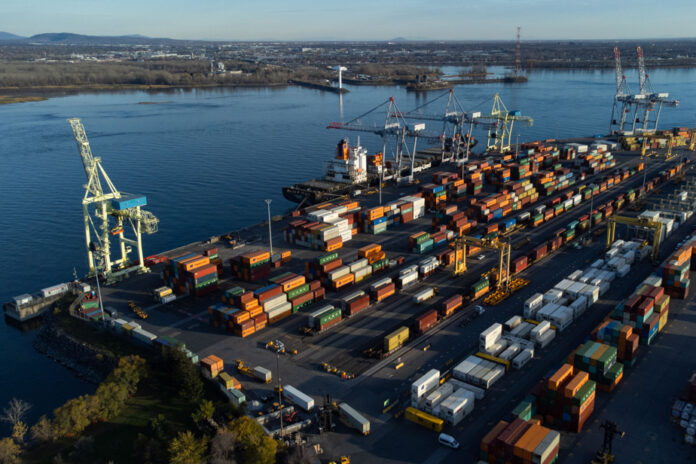While eyes are on the strike paralyzing the Port of Vancouver, the countdown may have begun in Montreal. The longshoremen’s collective agreement expires at the end of the year, and the contentious points at the heart of the last labor dispute – which ended with a special law – remain unresolved.
“I am very concerned about the situation in the metropolis, concedes Brian Slack, professor emeritus at Concordia University and specialist in maritime transport. The situation on the West Coast is distinct, but longshoremen are fighting for similar things to here: job security, working hours and, of course, money. »
In Montreal, where 40 million tons of goods are handled annually, the terms of the employment contract for the 1,100 employees who load and unload goods at the terminals were determined by arbitrator André G. Lavoie. Appointed in May 2021 after the adoption of a special law by the Trudeau government to end the walkout, he had decided on elements such as salary increases (18% and retroactive to January 1, 2019) and the duration of the agreement (five years).
However, he had opted for the status quo with regard to more sensitive elements by sending a message to the Canadian Union of Public Employees (CUPE), affiliated with the FTQ, and to the Maritime Employers Association (AEM). Points in dispute such as schedules and job security – at the heart of the impasse – had to be settled in a negotiated manner, Mr. Lavoie wrote.
“My role is not to rewrite the collective agreement,” warned the arbitrator.
It is therefore in this context that CUPE and the MEA will have to try to find common ground and thus avoid a new labor dispute – which would be the third to arise since the summer of 2020. On both sides , Tuesday, we preferred to play it safe by declining interview requests on this subject.
It will be necessary to wait until the fall for the negotiations to get under way, against a background of economic slowdown, which is causing the tonnage to decline.
“In accordance with the provisions of the Canada Labor Code, we could receive a notice to bargain as of September 1 in order to officially begin the process”, underlines Isabelle Pelletier, vice-president, communication and public affairs, of the MEA.
It is the employer of longshoremen, who load and unload ships. The Association negotiates and administers the employment contracts of its members in Montreal, Contrecœur, Trois-Rivières, Bécancour, Hamilton and Toronto.
However, according to information compiled by La Presse from various sources involved in the case who asked not to be identified, the level of optimism is not very high. Obviously, the special law of Ottawa left traces on the state of the relations between the representatives of the longshoremen and the MEA.
Currently, in the event of a walkout, the activities of longshoremen are not considered essential services. The Canada Industrial Relations Board, a quasi-judicial tribunal specializing in federal labor relations, ruled in this regard in June 2020 following a request from the MEA. Ottawa has given no indication that this may change.
For Jean-Paul Rodrigue, transport expert and professor at Hofstra University in New York, what will happen in British Columbia, where 7,400 stevedores are working in some 30 ports, could well give a glimpse of what awaits the Port of Montreal.
“It [the Vancouver conflict] is likely to set the stakes here,” he said. It’s a big question what will happen here, but what’s happening on the other side of the country should set the tone. »
At Manufacturiers et Exportateurs du Québec (MEQ), where members are highly dependent on the activities of the Port of Montreal, President and CEO Véronique Proulx refrains from speculating on upcoming negotiations.
However, she expects companies to prepare for all eventualities.
“Lessons have been learned,” says Ms. Proulx. Knowing that there have been two strikes in Montreal, I think we can expect to see companies take action in advance. For example, we could find other options to the usual routes. The last thing they want is to have a container full of critical materials stuck. »
For its part, the Montreal Port Authority (MPA) must content itself with the role of spectator. The federal agency, which maintains and leases port facilities to private stevedoring companies, does not have the power to intervene in the case.
The Trudeau government’s special law targeting dockworkers at the Port of Montreal is still the subject of litigation in the courts. CUPE is challenging its validity before the Superior Court of Quebec. The decision is still awaited. Since 2015, the right to strike has enjoyed constitutional protection in the wake of the Saskatchewan decision of the Supreme Court of Canada.
December 31, 2018: Longshoremen’s employment contract expires.
August 10, 2020: an indefinite general strike is called.
August 21, 2020: A seven-month truce occurs between workers and employer.
April 26, 2021: new indefinite general strike
April 30, 2021: The special law that forces a return to work is sanctioned by Ottawa.
December 9, 2022: An arbitrator decides on a new collective agreement.





